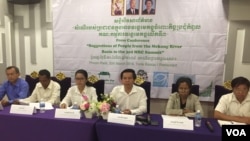As hydropower projects continue to be built along the Mekong mainstream, fishing communities living near the Tonle Sap river in Cambodia say their way of life is already changing.
On Wednesday, regional governments met in Siem Reap for the third Mekong River Commission (MRC) summit.
Long Socheat, a representative of the Tonle Sap fishing community in Pursat province, said in the past fishermen would go out on the lake for two or three days at a time, returning with enough produce to rest in-between trips and live off the proceeds.
“But since the resources declined, the can’t do that anymore. They have to go and fish daily and don’t have time to take a break. If they don’t go fishing every day, they will face troubles in their livelihoods,” he said.
As a result of dwindling fish stocks, increasingly people are using machinery purchased with micro-loans to fish the lake, which has led many fishing families to fall into debt.
Chin Sokunthor, a fisherwoman from Kratie province’s Sambo district, near the site of one of the largest planned hydropower projects in Cambodia, said if the dam is approved, the community will face the same fate as the Lower Sesan II community, whose homes were recently flooded to make way for a China-backed project.
“We tried to prevent the government [from building the dam], but the government has to go ahead. So if it has to be going forward, make sure that the people will not be totally affected,” she said in a press conference in Phnom Penh on March 30.
The comments from the two community members were submitted to the four Mekong region governments who will attend the MRC summit where they will discuss the plans for the Sambor hydropower dam.
“The development of national power development plan should necessarily engage the public, both females and males of all ages, especially affected communities, in a meaningful consultation process to ensure the plan will not have any negative impacts on the environment, natural resources and the well-being of local people,” a statement accompanying the comments reads.
“The Cambodian government should disclose relevant information and supporting documents related to the proposed Sambor dam in Kratie province. The government should ensure that affected community members and other relevant stakeholders can effectively and fully participate in consultations and the decision-making process,” it added.
Tek Vannara, executive director of the NGO Forum, said civil society groups from other countries would provide more ideas regarding the change in the flow of the Mekong river as well the Mekong basin in advance of the summit.
“Separately, regarding each civil society group in each country, they would have requests for the summit in relation to water resource management, the guaranteeing of sustainability of the environment, ecology, livelihood, and agricultural systems, including the water flow in the river, which is a part of preserving the sustainability of living standards and the lives of 65 million people who rely directly on the Mekong river, while another 300 million people rely indirectly on the resources stemming from the Mekong basin,” he said.




